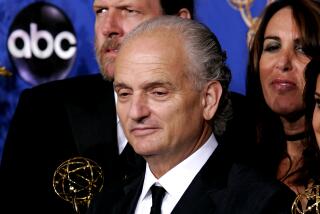NBC’s President Takes a Potshot at ‘The Sopranos’
- Share via
In a move that left Home Box Office executives angry and puzzled, NBC President Robert Wright recently wrote to select members of Hollywood’s production community soliciting views about “The Sopranos” and its influence on popular entertainment--at the same time stressing that the pay-television series is “a show which we could not and would not air on NBC because of the violence, language and nudity.”
Wright’s unusual letter, dated April 23 and distributed to producers, agents and executives both inside and outside the network, was accompanied by a tape of a “Sopranos” episode that contained extensive nudity and a scene in which a stripper is beaten to death.
The NBC executive, who is also vice chairman of NBC parent General Electric Co., asked for thoughts regarding “how [the show] impacts mainstream entertainment,” given its critical acclaim and receipt of a prestigious Peabody Award.
“As we move ahead making plans for our new season, I believe we need to give serious thought to this issue,” Wright’s letter concluded.
Reached Tuesday afternoon, Wright said his goal was simply to provoke a dialogue about where network programming is heading, citing the rapid and unforeseeable changes--from the popularity of unscripted programming to the invasion of European formats--that have affected the networks in recent years.
In its third season, “The Sopranos,” which focuses on a Mafia kingpin and his interactions with his professional and personal families, has quickly become the most-watched program on cable television--despite the fact that HBO, a division of AOL Time Warner, is available in only about a third as many homes as the major broadcast networks.
The program has received inordinate media attention, including a recent cover story in Newsweek magazine framed by the statement, “Why ‘The Sopranos’ has the rest of TV running for its life.”
HBO officials were annoyed by what they saw as the disapproving tone of Wright’s letter, saying it trivializes “The Sopranos” by defining the series through its use of nudity, language and violence.
“To characterize ‘The Sopranos’ that way . . . is unfair,” said HBO Chairman Jeff Bewkes. “I think he’s basically trying to throw some water on our enterprise here.”
Wright, however, said he chose “The Sopranos” as a base point because of the show’s popularity and merely wanted a variety of viewpoints. “The last thing I need to be doing is giving publicity to HBO,” he said, calling that “the unfortunate byproduct of doing something like this.”
NBC is in the process of screening new series candidates for next season--as are all the broadcast networks. One executive speculated that Wright might want to send a message to producers who have cited “The Sopranos” as a rationale for relaxing network standards.
Still, both HBO’s Bewkes and sources at competing broadcast networks maintain that any discussion of “The Sopranos” in relation to network content is essentially moot. As a broadcaster, NBC must rely on support from advertisers and the local TV stations that carry its programming, both of which probably would balk at content like that of “The Sopranos,” a point Wright acknowledged.
HBO, by contrast, relies solely on fees paid by cable subscribers and thus is not constrained by the mandate of reaching a vast audience or what is acceptable to advertisers.
“I have the greatest respect for Bob Wright,” said Brad Grey, whose Brad Grey Television produces “The Sopranos.”
“However, people are entitled to pay for the entertainment they enjoy. I’m not quite clear what the point is.”
Wright denied harboring any ulterior motives for the message, from bolstering NBC’s “The West Wing”--which has swapped major awards with “The Sopranos”--in its pursuit of another Emmy Award as outstanding dramatic series to reminding elected officials that broadcast networks operate under far more stringent standards than many of their competitors.
Bewkes would not speculate about such motives, but he said of Wright: “This is not a disinterested observer.”
More to Read
The biggest entertainment stories
Get our big stories about Hollywood, film, television, music, arts, culture and more right in your inbox as soon as they publish.
You may occasionally receive promotional content from the Los Angeles Times.










